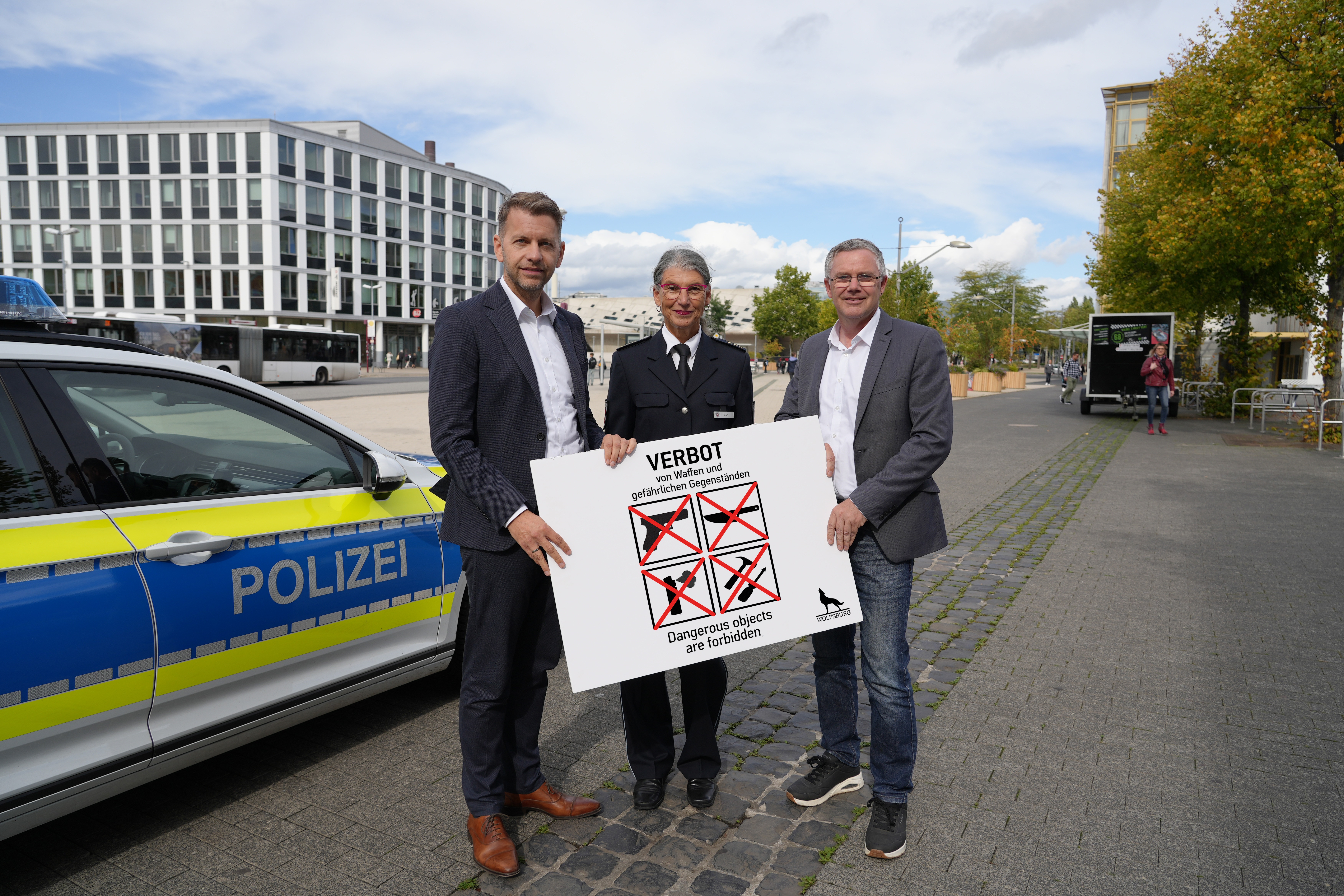Weapons ban zone at the Nordkopf
Council decides to set up

"The safety of our citizens is our top priority. Together with the police, we must use the available framework to make public spaces safer. The establishment of a weapons ban zone at Nordkopf is an important measure to further strengthen safety and thus also the quality of life in our city center," explains Mayor Dennis Weilmann about the weapons ban zone.
"The weapons ban zone will give both the police and the city's public order service significantly more opportunities to monitor and intervene. This is the decisive point on the way to more safety at the Nordkopf: preventive measures that can stop violent crimes with weapons before a confrontation occurs," emphasize Andreas Bauer, Head of the Public Order Department, and Heike Heil, Head of the Central Criminal Investigation Department of the Wolfsburg/Helmstedt Police Inspectorate.
According to police statistics, there were 39 violent crimes at Nordkopf in 2022 and 41 in 2023. The police already monitor this area closely, but have now been given more powers with the weapons ban zone.
We have compiled the most important information for you:
FAQ Weapons Prohibition Zone
-
What is the gun ban zone?
The weapons prohibition zone is a defined area in which the carrying of weapons and dangerous objects (i.e. those that can be used as weapons) is generally prohibited.
-
Where does the gun ban zone apply?
The weapons ban zone applies in the area of the northern end of Porschestraße and includes the areas around the ZOB, Porschestraße up to the main railway station, the Bahnhofspassage and part of Poststraße as well as the area from the Heßlinger street and the outlet center to the Berliner Ring.
Area marked in red on the map:

-
Which items are prohibited?
All objects that are defined as weapons under the Weapons Act are prohibited. These include in particular
- Firearms (pistols, rifles, etc.),
- Gas and signal weapons,
- cutting and stabbing weapons (e.g. swords, daggers), throwing weapons (e.g. throwing stars).
In addition, knives with fixed or lockable blades are prohibited if the blade length is more than four centimeters.
The ban also applies to objects that could cause serious injury due to their nature and type of use. Examples are
- Axes, hatchets and hammers,
- clubs and batons (including improvised striking weapons such as baseball bats),
- Gloves with hard fillings (e.g. quartz sand gloves),
- razor blades and certain knives that do not already fall under the definition of weapons,
- Irritant spraying devices that are not covered by the Weapons Act.
-
Which items are permitted?
Everyday, harmless objects are permitted in the Wolfsburg weapons ban zone as long as they cannot be used for violence. This includes personal items such as cell phones, keys and bags as well as certain work utensils or medical aids, as long as they do not have any dangerous properties. Animal repellent sprays are also permitted.
-
What happens if you have just bought an item that is actually prohibited?
Newly purchased items may be transported through the weapons ban zone as long as they are in their original packaging or are not immediately accessible. Buyers should also ensure that they leave the area quickly and do not use the items in public.
-
What applies to residents?
The weapons prohibition zone applies in public spaces. The restrictions of the weapons ban zone do not apply within your own home, business premises or pacified property. Residents may continue to possess weapons or knives there, provided this is permitted by law.
Residents may transport prohibited items such as weapons, knives or dangerous objects in locked containers or packaging that prevent immediate access. This applies, for example, to transportation to or from their home (e.g. when moving house). -
What applies to "transit passengers" (e.g. in a car or bus)?
Road users may drive through the no-weapons zone if the prohibited items are safely stowed away and inaccessible. The prohibited weapons zone must be passed through without interruption. Any interruption not caused by traffic is not permitted.
Objects may only be transported on public transport in locked containers. Any use or holding is prohibited. -
Who is exempt from the regulation?
Professional groups with an official interest are exempt from the regulations of the weapons ban zone. These include in particular the police, the municipal public order service, emergency services, commercial security services and cash-in-transit companies.
Occupational groups are also exempt if prohibited items are required to carry out a specific work assignment, for example tradespeople or caterers.
In addition, exemptions can be issued by the city of Wolfsburg if there is no threat to public safety.
-
Why are we doing this?
The introduction of weapons prohibition zones is aimed at ensuring public safety and order and minimizing the risk to citizens from weapons and dangerous objects. There are several reasons for the creation of such zones.
-
What penalty for violation?
Violations of the weapons ban zone in Wolfsburg can result in fines of up to 10,000 euros for carrying weapons or knives and up to 5,000 euros for carrying dangerous objects. The prohibited items can also be confiscated.
-
How is compliance monitored?
The police are responsible for enforcing the ban. They can carry out spot checks or regular patrols in the weapons ban zone and stop and check people.
In addition to the police, the municipal public order service can also monitor compliance with the ordinance as part of its duties.